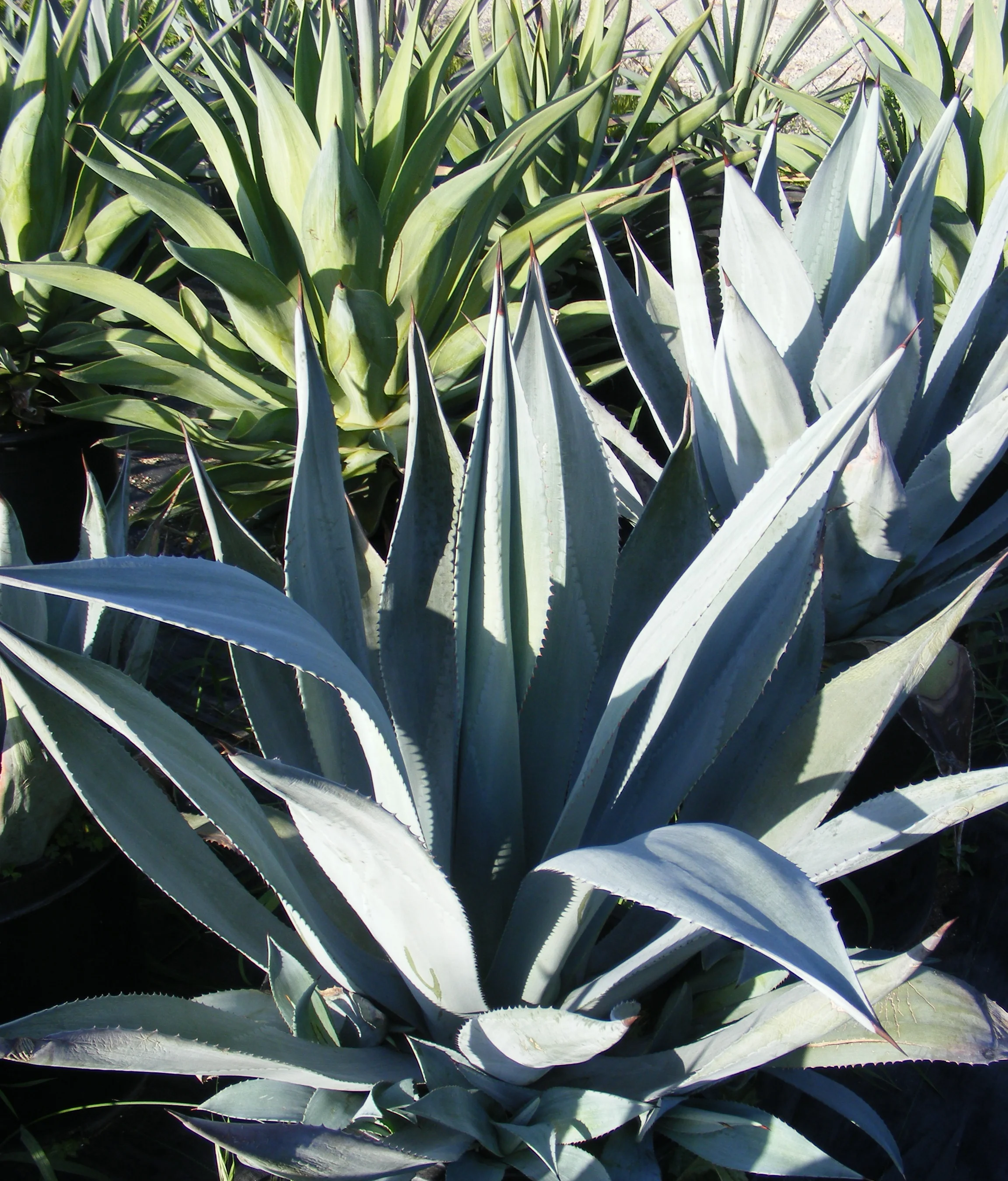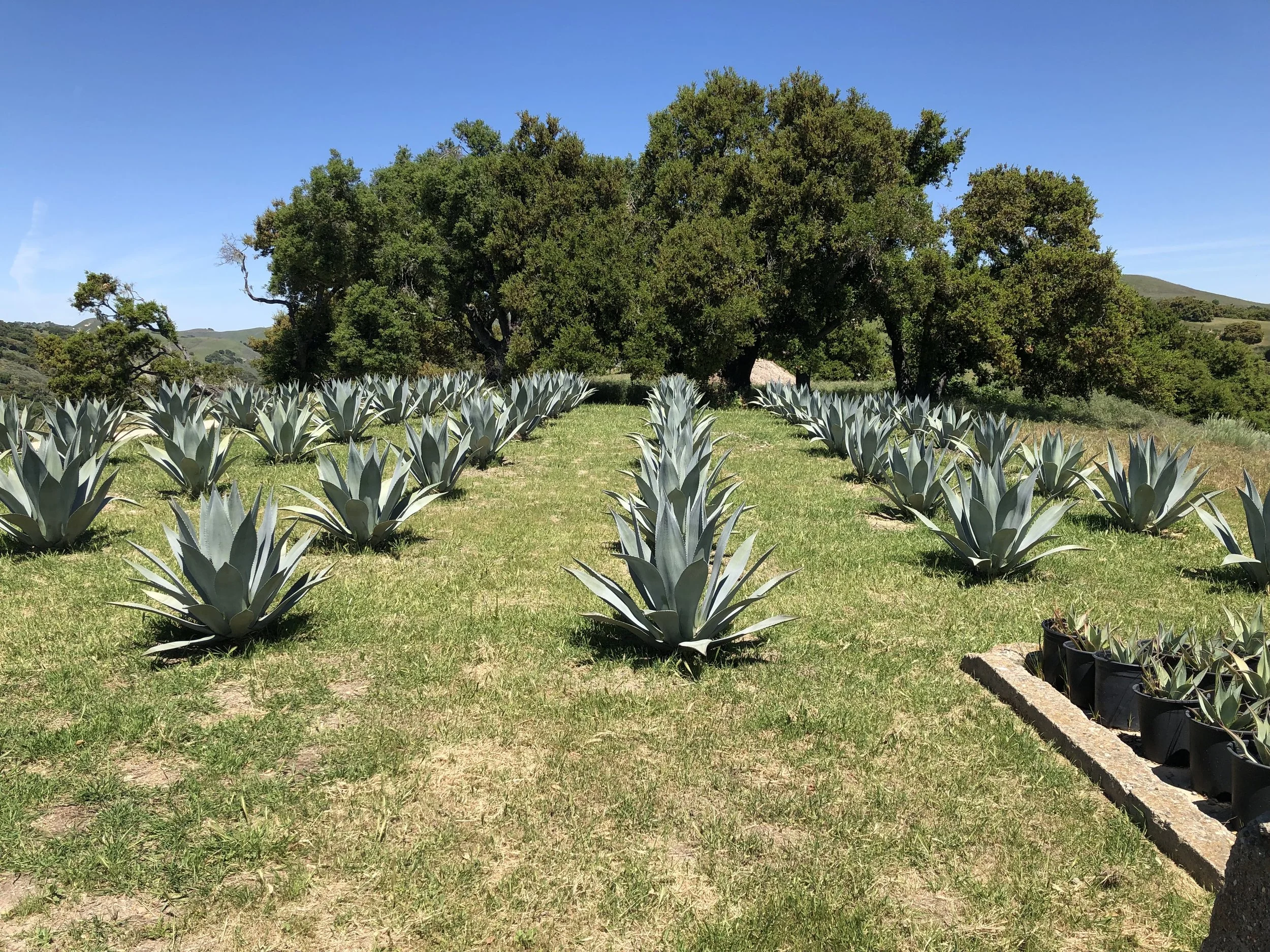We believe in Agaves as a keystone species for regenerative and sustainable agriculture appropriate for many regions in California, Arizona, Texas and New Mexico. We grow Agave species with economic value specializing in Agaves traditionally used to make Tequila and Mezcal in Mexico and used as food, beverage and fiber by other peoples historically. Doug began working with Agaves in the Southern California landscape in the 1970’s and continued to develop his knowledge and understanding of the species deciding to collect and propagate Agaves in our nursery operation in the 1990’s with a vision for a new Agave industry in the American Southwest.
Agave weberi in Buellton, CA
Agaves for Distilled Spirits
Historically in Mexico Tequila was traditionally made from many different Agaves, not just one as it is now. The Blue Agave, Agave angustifolia ssp. tequilana weber azul, is since 1993, the only legally permitted Agave to be used in the production of Tequila. Restricting Tequila production to this one clone, albeit an excellent one, has created an extreme monoculture with much reduced genetic diversity and attendant problems like less adaptability to different soils, altitudes, minimum temperatures, total heat and total rainfall, making the plantings more stressed, less vigorous, and more susceptible to pests and diseases which are then difficult to stop or control.
Mescal and other regional distilled Agave spirits in Mexico, like Raicilla and Bacanora are made from other Agave species, sometimes more than one, often collected from the wild. For me, the lesson is that a distinctive world class distilled Agave spirit can be made from a variety of Agave species, not just one. This is very important because in the U.S. in the American Southwest, where we can successfully grow Agave species suitable for distilling we cannot call our distilled product either Tequila or Mescal because those names are protected by international law. In the past ten years we have supplied Agaves and our expertise on growing them to landowners in California, Arizona, New Mexico and Texas. The burgeoning industry in California has developed and several memorable distilled spirits have been produced by craft distillers.
Ecological Land Design Applications
Agaves are an appropriate crop for areas of wildfire or where erosion or slope stabilization is an issue. Agaves are low fuel, succulent plants making excellent fire breaks and border plantings. Their root system and minimal water requirement make them a well known erosion control plant choice. Our Agave varieties are adaptable to many soil types, including difficult soils which cause problems for many other crops. Properly designed plantings of Agaves are effective against erosion and slope failure.
Diversity
Mescal and other regional distilled Agave spirits in Mexico, like Raicilla and Bacanora are made from other Agave species, sometimes more than one, often collected from the wild. For me, the lesson is that a distinctive world class distilled Agave spirit can be made from a variety of Agave species, not just one. We can analyze a site’s ecological parameters and select a combination of Agaves that are adapted for that site’s soils and climate regime.
Why a combination? Diversity for crop health, to create levels of adaptability and resistance. And yes! We do have and will incorporate Agave tequilana into the mix where minimum temperatures and water availability permit.
Agaves for Sale
We grow over 30 Agaves in our nursery, and though we do grow several clones of the Blue Agave used to make Tequila in Mexico- Agave tequilana weberi azul our emphasis is on species with greater adaptability to cold and heat and with lower water requirements. These Agaves have economical value as a crop and were selected because of their historical use in making fermented and distilled products or their culinary uses in indigenous cultures. The Agaves we grow are low in sapogenins, a compound that is not desirable for consumption found in some Agave species. Along with Mexican Agave species we grow California natives and Arizona natives and domesticates. Each Agave has a unique growth habit and adaptability to climate and exposure. Our Agave species are container grown from seed, offshoots (pups, Hijuelos) and bulbils- all sourced from our own mother stock, from California landscapes accessible to us and from other locations within the American Southwest. We do not source plant material from Mexico. Our container sizes include 1-gallon, 2-gallon, 5-gallon and 15-gallon. The size you choose will depend on your site conditions, your ability to attend to your Agaves once planted, your budget and our current availability. Our Agaves are grown with organic practices. Please contact us for current availability and pricing.
To learn about other uses and products derived from Agaves please see Crop Products



